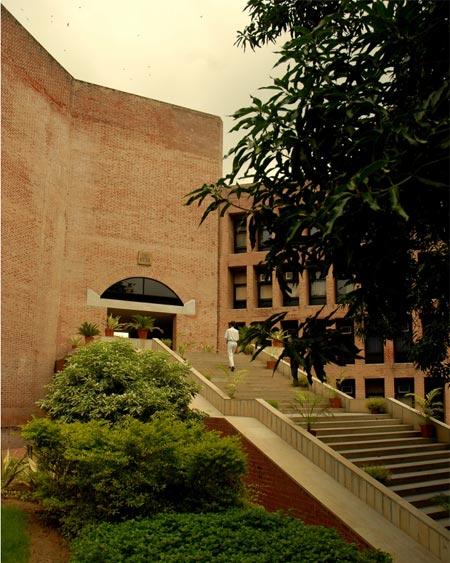Photographs: Gyancentral.com Gyancentral.com
Rahul Roushan, an alumnus of the Indian Institute of Management-Ahmedabad and a journalist by profession went on to start FakingNews.com, India's first satire based business in 2008. Here he tells Gyancentral.com how he did it.
An old quote goes 'Satire is traditionally the weapon of the powerless against the powerful'.
FakingNews.com stands true to this; it is in a way the voice of people's inner feelings about the over all socio-economic-political status of the country.
Satire is people as they are; romanticism, people as they would like to be; realism, people as they seem with their insides left out.
GyanCentral.com spoke to Rahul Roushan, a journalist by profession who studied Management at the Indian Institute of Management-Ahmedabad and went on to start FakingNews.com, India's first satire based business.
Read on to what inspired journalist turned entrepreneur towards satire-based news as he takes us through his journey of success.
What inspired you to start Faking news? How did it grow viral?
Having been a journalist, I always wanted to write about current affairs, but I thought starting another journalistic blog might not be the best thing to do, so I decided to experiment with 'news satire' genre.
It grew viral as people liked my take on issues, which was often coated in absurd/humorous spin on current affairs. A couple of fake news reports could fool the mainstream media into believing that they were real reports, and that too helped.
How do you manage your full time work with Faking news. How did you manage to attract multiple writers?
I can manage it because I love doing this! With growing popularity, it attracted writers, some of whom are pretty regular in contributing.
After doing a PG Diploma in journalism, What was the reason for pursuing a MBA?
I was a bit disillusioned with the world of journalism, especially television journalism, and it started appearing like just another job for me. That's when I decided to go for a career change. I can't do something that I'm not enjoying.
'Education at IIM-A gave me a lot of confidence'
Image: Indian Institute of Management-AhmedabadHow did your education at IIM-A aid you in setting up FN?
Well, the education at IIM-A gave me a lot of confidence and taught me a lot of things, but setting up FN was mostly an experiment in blogging, which was more rooted in my experience as a journalist, that has now become a full time job.
Also, I was notorious among my batchmates at IIM-A for digging up weird news (but real news) from around the world and that played part in making me believe that I had this ability to spot oddity.
When it came to making FN a full time job, which meant finding ways in which I can sustain myself financially, the education at IIM-A definitely helped.
Apart from advertising are there other sources of income for faking news?
Not yet, there have been queries about writing sponsored stories, but I've tried to avoid them till now. There are other plans in the pipeline, and let's see when it can materialize.
What is the future vision for Faking news? Any plans to take The Onion head on and compete at a global level?
Brand-wise Faking News is already "The Onion" of India, and I want to grow it to a bigger level and have diverse content to truly be comparable to The Onion, right now, it's just a fraction of what The Onion is. Competing with The Onion is a bit too far fetched, also they are mostly "American" than global. Faking News too will remain mostly "Indian".
How does it feel when the mainstream media publishes 'Faking news' as 'real news'?
Flattering! I feel proud of my journalistic background, it's still alive ;)
'Cricstock made me learn the basics of running an online venture'
What are the challenges you faced in being the first mover in the online satire genre in India?There were some, like people didn't "get the point", many of them still miss it and think it's just about humor and jokes.
To make people want to visit the website daily was another big challenge, which I hope I have been able to attain.
Today people do look forward to a "faking news" take on any breaking news.
From founding the quite popular cricstock to the stint at Sahara Samay running a management consulting firm and FN founder, How has been the journey? What were the lessons learnt?
Yeah, the journey has been interesting and colourful!
I loved every experience and all of them taught me something new. Journalism/media taught me to anticipate what the masses are interested in, while management consulting taught me how to analyse every issue from different perspectives.
Cricstock made me learn the basics of running an online venture.
How do you come with topics for satire? Do you research a lot?
Yes, I do research for news and current affairs, and if I decide on a topic, I do try to find out various aspects of that topic.
Mostly I decide the topics based on current affairs, but generally it is anything that can interest a common reader is always a prospective topic for me.
You were also involved with Association for Democratic Reforms a political initiative of IIM alumni, What is the status now?
Not really. I was not an active member.
The CAT 2011 results were declared recently. What is your advice for the students who did not make it to the IIMs?
Well, MBA as an educational degree is no rocket-science but institutes do matter. More than that students need to ask why do they want to do an MBA. They can get answers there itself.
Your advise for aspiring journalist and students wanting to make a career in media?
Be ready for some professional shocks, but don't compromise on the basics of journalism.




Comment
article